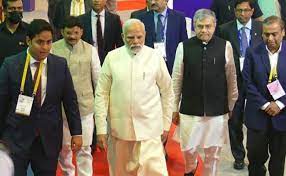
A record bid of Rs 1.5 lakh crore was received, with Mukesh Ambani’s Jio bagging nearly half of all airwaves sold with a bid of Rs 88,078 crore. In the first phase, around 13 cities across the country will get 5G services.
The country’s three major telecom operators demonstrated a use case each to the Prime Minister to showcase the potential of 5G technology in India. Reliance Jio connected a teacher from a Mumbai school with students from three different locations in Maharashtra, Gujarat and Odisha.
It demonstrated how 5G would facilitate education by bringing teachers closer to students, bridging the physical distance between them. It will showcase the power of Augmented Reality (AR) on screen and demonstrate how it is being used to remotely teach children across the country, without the need for an AR device.
What are the benefits of 5G technology?
5G technology will provide vast benefits to the common people. This will help in providing uninterrupted coverage, high data rates, low latency and highly reliable communication.
This will increase energy efficiency, spectrum efficiency and network efficiency. 5G technology will help connect billions of Internet of Things devices, allow high-quality video services with mobility at high speeds, tele-surgery and the delivery of critical services such as autonomous cars.
5G will help reduce the role of humans in real-time monitoring of disasters, precision agriculture, hazardous industrial operations such as deep mines, offshore activities, etc. Unlike existing mobile communication networks, 5G networks will allow tailoring of requirements for each of these. Different use cases within the same network.

